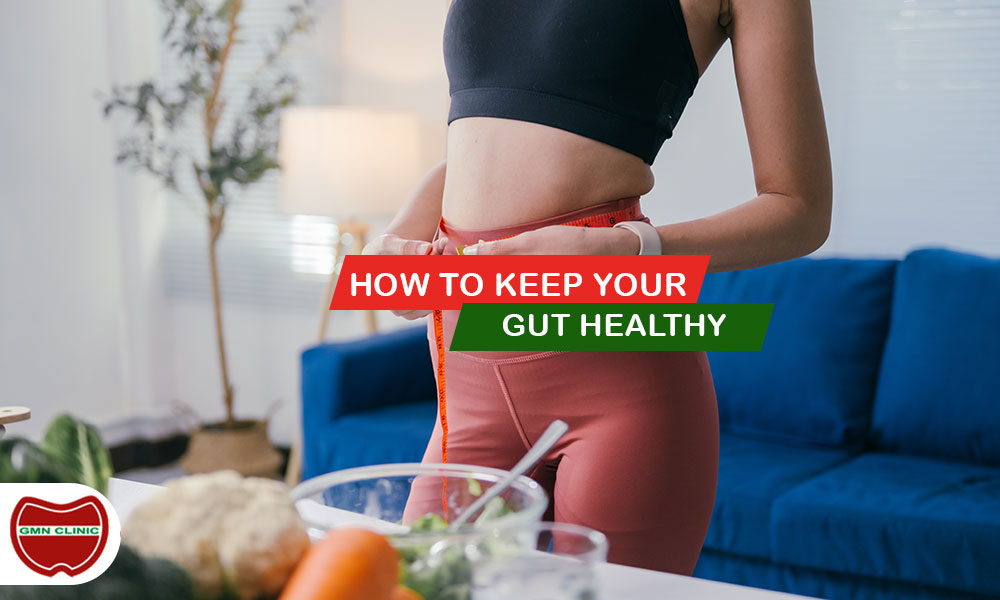The foods that you eat affect your body more than you think. The role of a healthy gut is major in keeping your body healthy. When you maintain a healthy gut, you can see an improved performance of the function of body. The immune system and the digestive system start performing better and keep you healthy.

Some of the very common signs of bad guts are bloating and constipation. When you face these problems, you must start getting careful and take care of your gut. You can get some expert guidance from a dietitian. In this article, we have shared some simple tips to keep your gut healthy from a trusted dietitian in Mumbai, let’s start:
1. Eat More Fibre-Rich Foods
Fibre helps food move through your digestive system. It also feeds the good bacteria in your gut.
Include:
- Some examples of whole grains-
Oats
Brown rice
Whole wheat roti
- Eat loads of fresh fruits-
Apple
Banana
Papaya
- Green leafy Vegetables are great for nutrition. Some of them are-
Carrots
Spinach
Cucumbers
- Eat a handful of seeds and nuts like-
Flaxseed
Almonds
These foods support digestion and prevent constipation.
-
Drink Enough Water
Water helps in the process of breaking down food. It also keeps bowel movements smooth.
- Keep a bottle of water close and drink water from time to time.
- A glass of warm water can be a great way to start your day.
- You can add lemon or a spoonful of honey. This will give an extra benefit to your health.
- Learn the importance of hydration and how much water you should drink in a day here.
-
Importance of Probiotics
Probiotics are good bacteria. They are found in your gut. They help to balance your gut and keep it healthy.
Some probiotic-rich foods include:
- Curd or yogurt
- Buttermilk (chaas)
- Homemade pickles (in small amounts)
- Fermented foods like idlis, dosas, and dhoklas
-
Limit Sugar and Junk Food
Too much sugar and processed food are not good for your gut. They feed the bad bacteria in your gut. This can cause bloating and gas.
Foods you should avoid are:
- Soft drinks
- Packaged snacks
- Fried foods
- Excess sweets
Replace them with fruits, fresh juices, or home-cooked snacks.
-
Chew Your Food Slowly
Digestion starts in your mouth.
- It becomes easier for your stomach to digest the food by properly chewing the food.
- Eating too fast can cause bloating, indigestion, and gas.
- Take your time. Enjoy your food. Sit down and eat without distractions.
-
Stay Active
Exercise helps your gut move food better. It also reduces stress, which affects your stomach.
Try:
- Walking for 30 minutes daily
- Doing yoga
- Light stretching in the morning
- Regular movement keeps your gut active and happy.
-
Manage Your Stress
Your gut and brain are connected. High stress can cause stomach issues like acidity, cramps, and poor digestion.
To reduce stress:
- Meditate for 5-10 minutes daily
- Do deep breathing
- Listen to music or take short breaks
- Talk to someone you trust
- Your gut will thank you for staying calm and peaceful.
-
Get Enough Sleep
- Lack of sleep affects your gut health.
- Aim for 7–8 hours of quality sleep every night.
- Sleep helps your gut rest and repair.
- Try to sleep and wake up at the same time every day.
-
Don’t take antibiotics very often
There are both good and bad bacteria present in our bodies. Antibiotics kill both types of bacteria.
- Don’t use antibiotics very frequently.
- Take them only when prescribed by your doctor or when you need them.
- When you are consuming them or after completing the course of antibiotics, you must eat probiotic-rich food. This will help to restore the balance in your gut.
-
Listen to Your Body
If you feel discomfort or have frequent constipation, don’t ignore it. even feeling bloated is not a good sign. So, make sure to get yourself checked when these things happen or come to notice.
- Keep track of what you eat.
- Observe how your stomach reacts.
Sometimes, simple changes in diet can solve big problems. Go and talk to a dietitian in Mumbai for more personalized advice.
Final Thoughts
Your gut health depends on what you eat. Our body needs the right food, to small habits like drinking enough water, eating fresh food, and reducing stress can make a big difference.
Start slow. Pick two or three tips and add them to your daily routine. Over time, you will feel lighter, healthier, and more energetic.
If your gut problems continue, you should consult. A certified dietitian in Mumbai can guide you with their expert advice. They can guide you based on your lifestyle and health needs.

Geetanjali- The Voice of Healthcare- a Reg, Clinical Dietician Nutritionist, Wellness-Speaker, Author, Anchor, Wellness Expert, Pod-caster, Blogger, You tuber is based in Mumbai
